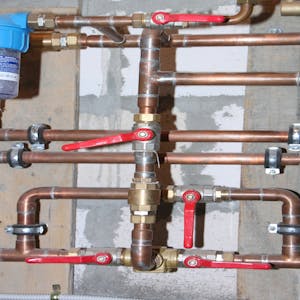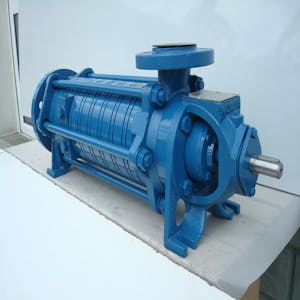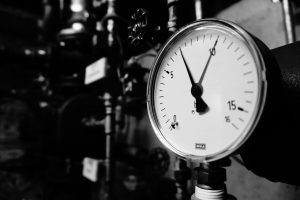Experts agree that the number one cause of hydraulic system failure is contamination. Hydraulic filters aid in trapping contamination before it can head downstream in the system, but a neglected filter can be worse than having no filter at all. Not only can a clogged filter release contaminants into your hydraulic system, but it can also result in failures of other equipment down the line that can wreak havoc and result in extensive downtime. This is why changing hydraulic filters on a regular basis is a must for your hydraulic equipment.
 When a filter becomes clogged with contaminants, a pressure drop develops across the filter as fluid can no longer pass through it freely. Once the pressure drop reaches a critical value, one of two things will happen. If the filter setup includes a bypass valve, then the fluid will bypass the filter once the pressure drop has reached a critical point (usually about 3 bar). This effectively means that the fluid is no longer being filtered and any new contaminants are allowed to pass unhindered.
If the filter does not have a bypass valve, the pressure drop resulting from the clogged filter will increase until the filter element collapses and all the contaminants are free to continue on their way. Not only has the filtered contamination entered the system, but it has contaminated the filter itself. In some systems, the pressure drop can cause an extreme increase in pressure upstream of the filter. If that pressure reaches high enough levels and if the filter does not collapse, other components in the system can be seriously damaged. This is one example of how not changing hydraulic filters can cause severe complications.
When a filter becomes clogged with contaminants, a pressure drop develops across the filter as fluid can no longer pass through it freely. Once the pressure drop reaches a critical value, one of two things will happen. If the filter setup includes a bypass valve, then the fluid will bypass the filter once the pressure drop has reached a critical point (usually about 3 bar). This effectively means that the fluid is no longer being filtered and any new contaminants are allowed to pass unhindered.
If the filter does not have a bypass valve, the pressure drop resulting from the clogged filter will increase until the filter element collapses and all the contaminants are free to continue on their way. Not only has the filtered contamination entered the system, but it has contaminated the filter itself. In some systems, the pressure drop can cause an extreme increase in pressure upstream of the filter. If that pressure reaches high enough levels and if the filter does not collapse, other components in the system can be seriously damaged. This is one example of how not changing hydraulic filters can cause severe complications.
 The fallout from a clogged filter can be very serious, both in terms of equipment damage and costs. There will be downtime as the cause of the resulting catastrophic failure is investigated. Once it has been discovered, the hydraulic system will need to be flushed to rid it of contamination.
Damaged components, such as pumps or motors, will need to be repaired or replaced. Then the system will need to have all new filters installed before it can be started again. The downtime associated with this process is extremely costly, especially when it is noted that the process for changing hydraulic filters costs just a fraction of this amount of time. There are, of course, the costs involved with repairing damaged components and cleaning up the aftermath of a failed filter.
The fallout from a clogged filter can be very serious, both in terms of equipment damage and costs. There will be downtime as the cause of the resulting catastrophic failure is investigated. Once it has been discovered, the hydraulic system will need to be flushed to rid it of contamination.
Damaged components, such as pumps or motors, will need to be repaired or replaced. Then the system will need to have all new filters installed before it can be started again. The downtime associated with this process is extremely costly, especially when it is noted that the process for changing hydraulic filters costs just a fraction of this amount of time. There are, of course, the costs involved with repairing damaged components and cleaning up the aftermath of a failed filter.
 It is far more economical to establish a proactive, routine schedule for changing hydraulic filters in your system than to let them fail. Preventative maintenance for your hydraulic filters enables your machines to run at a much higher level of efficiency. It minimizes the downtime, and puts the hydraulic maintenance company in control of the timing.
Preventative maintenance of filters solves the clogged filter problem before it even starts, which in turn promotes the cleanliness of your hydraulic system. That alone is reason enough when you remember that hydraulic contamination is the primary cause of system failure. Keeping your system clean also helps it to retain its value and stay in service longer.
It is far more economical to establish a proactive, routine schedule for changing hydraulic filters in your system than to let them fail. Preventative maintenance for your hydraulic filters enables your machines to run at a much higher level of efficiency. It minimizes the downtime, and puts the hydraulic maintenance company in control of the timing.
Preventative maintenance of filters solves the clogged filter problem before it even starts, which in turn promotes the cleanliness of your hydraulic system. That alone is reason enough when you remember that hydraulic contamination is the primary cause of system failure. Keeping your system clean also helps it to retain its value and stay in service longer.
 The other approach is to use an element condition indicator. An indicator measures the pressure drop across the filter. Once it reaches a critical level (e.g., 2 bar for a filter that has a 3 bar pressure drop when it is at capacity), the indicator reveals that you need to change the filter. Filters are then changed when the element indicators reveal that the filter is getting near capacity. Some maintenance departments and companies take this a step further and continuously monitor the pressure drops across the filters, which not only indicates when a filter needs to be changed but can reveal impending failure within the system and enable the technicians to track down the cause. This requires a significant upfront investment in transducers and sensors, a reliable system to log the data, and someone who knows how to extract useful information from that data.
The other approach is to use an element condition indicator. An indicator measures the pressure drop across the filter. Once it reaches a critical level (e.g., 2 bar for a filter that has a 3 bar pressure drop when it is at capacity), the indicator reveals that you need to change the filter. Filters are then changed when the element indicators reveal that the filter is getting near capacity. Some maintenance departments and companies take this a step further and continuously monitor the pressure drops across the filters, which not only indicates when a filter needs to be changed but can reveal impending failure within the system and enable the technicians to track down the cause. This requires a significant upfront investment in transducers and sensors, a reliable system to log the data, and someone who knows how to extract useful information from that data.
What Happens When a Hydraulic Filter Clogs
 When a filter becomes clogged with contaminants, a pressure drop develops across the filter as fluid can no longer pass through it freely. Once the pressure drop reaches a critical value, one of two things will happen. If the filter setup includes a bypass valve, then the fluid will bypass the filter once the pressure drop has reached a critical point (usually about 3 bar). This effectively means that the fluid is no longer being filtered and any new contaminants are allowed to pass unhindered.
If the filter does not have a bypass valve, the pressure drop resulting from the clogged filter will increase until the filter element collapses and all the contaminants are free to continue on their way. Not only has the filtered contamination entered the system, but it has contaminated the filter itself. In some systems, the pressure drop can cause an extreme increase in pressure upstream of the filter. If that pressure reaches high enough levels and if the filter does not collapse, other components in the system can be seriously damaged. This is one example of how not changing hydraulic filters can cause severe complications.
When a filter becomes clogged with contaminants, a pressure drop develops across the filter as fluid can no longer pass through it freely. Once the pressure drop reaches a critical value, one of two things will happen. If the filter setup includes a bypass valve, then the fluid will bypass the filter once the pressure drop has reached a critical point (usually about 3 bar). This effectively means that the fluid is no longer being filtered and any new contaminants are allowed to pass unhindered.
If the filter does not have a bypass valve, the pressure drop resulting from the clogged filter will increase until the filter element collapses and all the contaminants are free to continue on their way. Not only has the filtered contamination entered the system, but it has contaminated the filter itself. In some systems, the pressure drop can cause an extreme increase in pressure upstream of the filter. If that pressure reaches high enough levels and if the filter does not collapse, other components in the system can be seriously damaged. This is one example of how not changing hydraulic filters can cause severe complications.
Contaminated Equipment: Downtime and Costs
 The fallout from a clogged filter can be very serious, both in terms of equipment damage and costs. There will be downtime as the cause of the resulting catastrophic failure is investigated. Once it has been discovered, the hydraulic system will need to be flushed to rid it of contamination.
Damaged components, such as pumps or motors, will need to be repaired or replaced. Then the system will need to have all new filters installed before it can be started again. The downtime associated with this process is extremely costly, especially when it is noted that the process for changing hydraulic filters costs just a fraction of this amount of time. There are, of course, the costs involved with repairing damaged components and cleaning up the aftermath of a failed filter.
The fallout from a clogged filter can be very serious, both in terms of equipment damage and costs. There will be downtime as the cause of the resulting catastrophic failure is investigated. Once it has been discovered, the hydraulic system will need to be flushed to rid it of contamination.
Damaged components, such as pumps or motors, will need to be repaired or replaced. Then the system will need to have all new filters installed before it can be started again. The downtime associated with this process is extremely costly, especially when it is noted that the process for changing hydraulic filters costs just a fraction of this amount of time. There are, of course, the costs involved with repairing damaged components and cleaning up the aftermath of a failed filter.
Preventative Maintenance Schedules for Changing Hydraulic Filters
 It is far more economical to establish a proactive, routine schedule for changing hydraulic filters in your system than to let them fail. Preventative maintenance for your hydraulic filters enables your machines to run at a much higher level of efficiency. It minimizes the downtime, and puts the hydraulic maintenance company in control of the timing.
Preventative maintenance of filters solves the clogged filter problem before it even starts, which in turn promotes the cleanliness of your hydraulic system. That alone is reason enough when you remember that hydraulic contamination is the primary cause of system failure. Keeping your system clean also helps it to retain its value and stay in service longer.
It is far more economical to establish a proactive, routine schedule for changing hydraulic filters in your system than to let them fail. Preventative maintenance for your hydraulic filters enables your machines to run at a much higher level of efficiency. It minimizes the downtime, and puts the hydraulic maintenance company in control of the timing.
Preventative maintenance of filters solves the clogged filter problem before it even starts, which in turn promotes the cleanliness of your hydraulic system. That alone is reason enough when you remember that hydraulic contamination is the primary cause of system failure. Keeping your system clean also helps it to retain its value and stay in service longer.
The Right Time to Change Your Hydraulic Filters
That leads us to the main question: When is the right time to change your filters? There are two schools of thought on this subject. The first says that filters should be changed according to equipment manufacturer guidelines, which are typically based on hours of service. The drawback with that approach is that the filters may or may not need to be changed at that time. If they are overdue for a change, then you have compromised the efficiency of your machine and risked the messy aftermath of a clogged filter; if they do not need to be changed, you have wasted some of the useful life of the filter. In some cases, maintenance will use their own experience with the equipment to develop a schedule for changing the filters that makes better use of overall filter life. The other approach is to use an element condition indicator. An indicator measures the pressure drop across the filter. Once it reaches a critical level (e.g., 2 bar for a filter that has a 3 bar pressure drop when it is at capacity), the indicator reveals that you need to change the filter. Filters are then changed when the element indicators reveal that the filter is getting near capacity. Some maintenance departments and companies take this a step further and continuously monitor the pressure drops across the filters, which not only indicates when a filter needs to be changed but can reveal impending failure within the system and enable the technicians to track down the cause. This requires a significant upfront investment in transducers and sensors, a reliable system to log the data, and someone who knows how to extract useful information from that data.
The other approach is to use an element condition indicator. An indicator measures the pressure drop across the filter. Once it reaches a critical level (e.g., 2 bar for a filter that has a 3 bar pressure drop when it is at capacity), the indicator reveals that you need to change the filter. Filters are then changed when the element indicators reveal that the filter is getting near capacity. Some maintenance departments and companies take this a step further and continuously monitor the pressure drops across the filters, which not only indicates when a filter needs to be changed but can reveal impending failure within the system and enable the technicians to track down the cause. This requires a significant upfront investment in transducers and sensors, a reliable system to log the data, and someone who knows how to extract useful information from that data.


